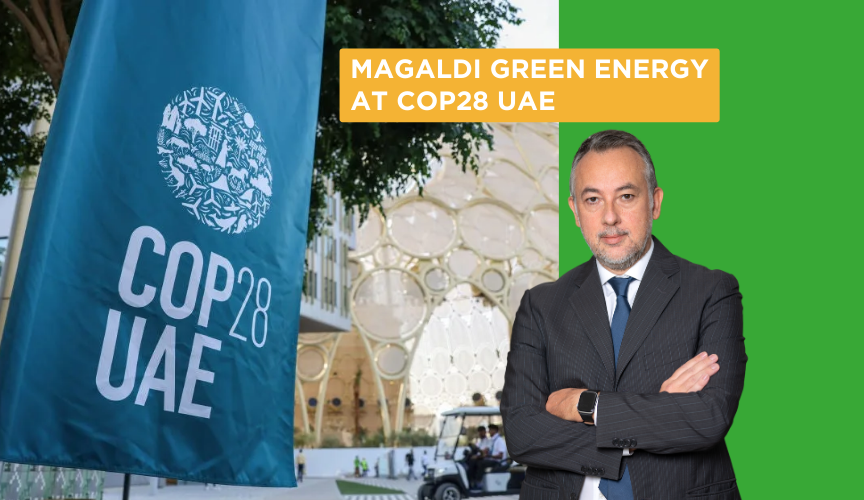
by Massimiliano Masi, General Manager in the United Arab Emirates for Magaldi Green Energy
Magaldi Green Energy at COP28, opening up opportunities for Power-to-Heat market expansion
In Dubai, COP28 achieved a miracle, albeit a small and revealing one for now. As the General Manager in the United Arab Emirates for Magaldi Green Energy in the green energy sector, I believe that the explicit mention of fossil fuels in the unanimously approved agreement during the latest United Nations climate change conference is a significant step. The inclusion of fossils in the commitment balance – known as the Global Stocktake – is a first-ever occurrence, signaling a crucial global recognition of the need for an inevitable energy transition towards entirely renewable sources for industries.
The Conference, although at a not particularly swift pace, also brings home additional results, summarized in the following 5 points.
1. Global emission targets
We must reduce emissions by 43% by 2030 and achieve net-zero emissions by 2050 to avoid surpassing the established threshold of a global temperature increase of 1.5°C. The goals are undoubtedly ambitious. Perhaps the most effective strategy will be to focus on realistic targets on a country-by-country basis, especially for the next 3 years, i.e., targets for 2024, 2025, and 2026. Each nation must define a specific and detailed roadmap for decarbonization.
2. Renewable energy enhancement
The capacity of renewable energy must triple, and energy efficiency must double by 2030. Achieving these targets is certainly possible, but streamlined approval processes are needed. Governments must simplify bureaucracy to truly accelerate the transition.
3. Reduction of coal usage
As the primary culprit for CO2 emissions, global use of coal must now be reduced. It is a righteous reduction, but China, India, and Australia must take concrete steps. These countries are tasked with planning the gradual phasing out of the most polluting coal plants.
4. Funding climate initiatives in developing countries
Developed nations need to allocate $5.8 to $5.9 trillion by 2030 for climate initiatives in developing countries. This is an enormous sum. It is vital to create regulatory bodies to guarantee the proper and effective utilization of these funds.
5. Adaptation to climate change
Developing countries will face annual costs of $215-387 billion until 2030 to adapt to global warming. The figures for this adaptation process are enormous. Doubling funds by 2025 will not be easy, both politically and financially. These countries will need to thoroughly assess debt sustainability and internal spending priorities, working towards consensus.
Additional topic: nuclear
Nuclear power is certainly another aspect to consider, but the issue must be approached from the standpoint of responsibility, safety concerns, nuclear waste management, and the high costs associated with the development and maintenance of nuclear plants. It is a challenge that must necessarily strike a balance between the needs for clean and secure energy production, taking into account environmental and social concerns. There are still some uncertainties regarding the feasibility of this, especially in countries that have long been opposed, such as Italy, and it will undoubtedly spark different debates on a nation-by-nation basis.
Is COP28 really the "bare minimum"?
Following COP28, figures like environmentalist and politician Al Gore have referred to the agreement as merely constituting the "bare minimum." We respectfully disagree: we are of the opinion that the outlined objectives are decidedly ambitious. Achieving the thresholds set in the global balance would be exceptional in itself. We prefer to view it in terms of enormous opportunities. The industrial transition from fossil fuels by 2050 presents significant incentives for international companies like Magaldi Green Energy.
Magaldi Green Energy's role at COP28
Long-duration storage technologies play a pivotal role in ensuring a smooth transition to renewables. COP28 has underscored this perspective, emphasizing the critical role of storage in balancing the grid and ensuring a reliable energy supply. Substantial investments are needed for crucial innovations, and our solution stands out as one of the best for harnessing the abundant renewable energy available, converting it into 24/7 accessible green heat. For Magaldi Green Energy – a pioneer in developing innovative green heat storage solutions for energy-intensive industries – this opens up further opportunities for expansion in the LDES - long duration energy storage power to heat market.
Magaldi Green Energy played a key role at COP28 by showcasing its innovations in green energy.
This exposure has not only strengthened the company's brand but has also facilitated new collaborations within the sector, including partnerships with entities such as the U.S. Department of Energy, LDES Council, EPRI, potential major international clients in the oil and gas industry, and utilities seeking decarbonization solutions. We have also initiated early discussions with various national stakeholders. As we've previously highlighted, as the share of renewable capacity in an energy system surpasses the 50% threshold, the need for storage (with duration as a key parameter) grows exponentially, eventually extending to seasonal storage (with a target of entire months).
Our MGTES - Magaldi Green Thermal Energy Storage is designed to provide an immediate, tailored to specific sectoral needs, modular, cost-effective response to the acceleration of industrial process decarbonization.
The green appeal of clean heat innovations
Despite the apparent affordability of fossils at present, it's essential to recognize that innovation in the renewable energy sector is vital and comes with significant initial costs. These expenses should be covered by governments through incentive programs, with end customers being willing to pay a premium for energy derived from renewable sources compared to traditional fuels.
For Magaldi Green Energy's innovations, the emphasis lies on both the environmental aspect and economic efficiency and sustainability. Green heat will be the game-changing energy source. So, can we be satisfied with COP28? Quoting the entrepreneur and philanthropist Isadore “Issy” Sharp, "we are only what we do, not what we say", It's time to act, starting with ourselves. My book "Total Renewable Energy" envisioned Dubai as the starting point for global decarbonization, much like it's unfolding after COP28. For years, the Magaldi Group has believed that storage is the answer, and the data has supported our stance for a long time. Starting from the next year, without looking too far ahead, our solutions will be implemented. We look to 2030, a year when the market will already experience a necessary strong acceleration.



